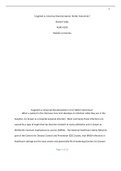1
Targeted vs Universal Decolonization: Better Outcomes?
Rachel Fields
NURS 4100
Walden University
Targeted vs Universal Decolonization in ICU: Better Outcomes?
When a patient in the Intensive Care Unit develops an infection while they are in the
hospital, it is known as a hospital acquired infection. Most commonly these infections are
caused by a type of staph that has become resistant to many antibiotics and is known as
Methicillin-resistant staphylococcus aureus (MRSA). The National Healthcare Safety Network,
part of the Centers for Disease Control and Prevention (CDC) states, that MRSA infections in
healthcare settings are the most severe and potentially life threatening (Centers for Disease
Page 1 of 23
, 2
Control, 2018). Along with patient risk, these infections cost hospitals thousands of dollars
each year and Medicare and Medicaid does not reimburse for hospital acquired infections.
There are two ways that Intensive Care Units (ICU) are working to combat infections like
these, and they develop protocols for either targeted or universal decolonization. The targeted
approach consists of a rapid MRSA nasal swab, followed by 5 days of contact isolation and daily
chlorhexidine baths. If the nasal swab is found to be positive, the patients are also treated with
intra-nasal mupirocin ointment twice a day for five days and retested again on day 7. They are
swabbed weekly until they have two consecutive negative swabs. The use of the universal
decolonization method includes no screening for MRSA on admission, patients with a history of
MRSA (carriers) are put on contact precautions, and all patients are given chlorhexidine baths
daily as well as treated with five days of intra-nasal mupirocin (Huang, S., Septimus, E.,
Kleinman, K., Moody, J., Hickok, J., Avery, T., Lankiewicz, J., Gombosev, A., Terpestra, L.,
Hartford, F., Hayden, M., Jernigan, J., Weinstein, R., Fraser, V., Haffenreffer, K., Cui, E., Kaganov,
R., Lolans, K., Perlins, J., Platt, R., for the CDC Prevention Epicenters Program and the AHRQ
DECIDE network and Healthcare-Associated Infections Program, 2013). Universal decolonization
eliminates the waiting time between swabbing and treatment as well as the cost from
unnecessarily using contact isolation supplies (personal protective equipment and cleaning
supplies).
The reduction of blood stream infections with the use of universal decolonization can be
nearly 40% as well as cost reduction (Huang et al, 2013). The decrease in blood stream
infections can be linked also to a decreased rate of catheter related blood stream infections,
also most commonly staph (Kirby, 2014). The cost of care per day in the intensive care unit is
25% less for patients without infections as compared to those who test positive for blood
Page 2 of 23
, 3
stream infections. Is there evidence to support the change from targeted decolonization to
universal decolonization? Would the use of universal decolonization for patients admitted to
the intensive care unit both reduce blood stream infections and health care costs compared to
targeted decolonization? The purpose of this paper is to address the evidence behind this
recommended practice change as well as introduce the plan for how implement this change.
Recommended Change in Practice
The current practice for adult patients admitted to the intensive care unit is to swab
both anterior nares with sterile culture swab. The specimen in then sent to lab for confirmation
by coagulase testing and the use of plasma agglutination assay as well as polymerase chain
reaction (PCR) to detect mecA genes (Oh-Hyun Cho, Eun Hwa Baek, Mi Hui Bak, Young Sun Suh,
KiHo Park, Sunjoo Kim, In-Gyu Bae and Sun Hee Lee, 2016). Patients with a known history of a
positive MRSA culture are put on contact isolation. These precautions are lifted if the PCR swab
obtained on admission comes back negative. Positive PCR results remain on contact isolation
and treated with chlorhexidine baths and mupirocin ointment applied to the nares twice a day.
The goal of the practice change would be to reduce hospital acquired MRSA infections
and reduce treatment cost of both PCR positive patients and those that become colonized
during their hospitalization. Moving to a universal decolonization protocol would reduce the
rates of
MRSA in clinical cultures and blood stream infections from any pathogen (Huang et al., 2013).
Several studies have shown that daily chlorhexidine baths alone can reduce the surface
concentration of bacteria on the body which precludes the decrease in the acquisition of MRSA
colonization while hospitalized (Huang et al., 2013). The use of universal decolonization can
Page 3 of 23




